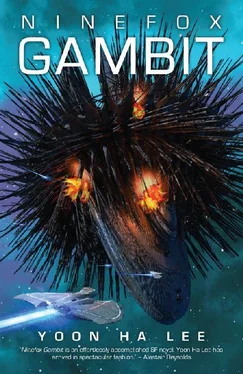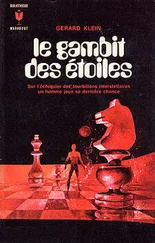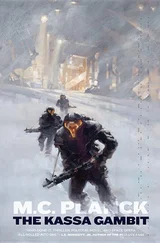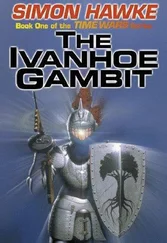Sometimes Mikodez thought Kujen would benefit from having his knuckles rapped. “Don’t get greedy,” he said. “You’ll have plenty of time to see if she can tell you anything about the latest cryptology conjectures after the Fortress has been dealt with.” Although whether she would prefer dealing with the Fortress or a sociopathic hexarch was an open question.
“Killjoy,” Kujen said. “You’re not going to fold on this one, are you?”
Mikodez smiled at him. “You wanted more funding for research on that latest jamming system, didn’t you?”
“It’s unlike you to resort to naked bribery,” Kujen said, “not that I’m complaining.”
“I’m bored,” Mikodez said, “and if I don’t spend this money, one of my subordinates will put it into something wholesome, like algorithmic threat identification.” He cultivated a reputation for being erratic for occasions like this.
“All right, all right, I’ll put in the authorizations on my end,” Kujen said. “You think you have paperwork, you should see mine.”
You think I don’t? Mikodez thought, but he kept his expression bland. Kujen’s security wasn’t nearly as up-to-date as he thought it was.
“At least I’ll get a chance to say hello to her,” Kujen went on, “even though I’m sure she’ll be focused on her duty. Sometimes I think Visyas and I did too good a job designing formation instinct, but the results can be adorable.”
Mikodez would have felt sorry for Kel Cheris, but at the moment Kujen was unlikely to damage anyone who had a chance of entertaining him in matters related to number theory. Besides, the emergency was real. A shame that she had made herself a candidate for dealing with the calendrical rot, but someone had to do it, and she had a better chance of survival than most.
“I’ll set it up, then,” Mikodez said. “Depending on how hard I can lean on Kel Command, I can get her to you in eighteen days or so.”
“Splendid,” Kujen said. “In the future, do try to be less transparent about avoiding me. It’s embarrassing when a grown Shuos is so obvious.” He signed off without waiting for a response.
Embarrassing, but worth it to ensure that his preferred candidate was sent to deal with the calendrical rot. Mikodez spent several minutes composing his instructions to Kel Command, then sent them off.
Kel Cheris was sane, although the odds were that she wouldn’t stay that way. Still, Mikodez had to trade her welfare for the hexarchate’s. Someday someone might come up with a better government, one in which brainwashing and the remembrances’ ritual torture weren’t an unremarkable fact of life. Until then, he did what he could.
CHERIS SPENT THE flight back to the boxmoth infantry transport in silence. The boxmoth was like any other: walls painted solemn black and charcoal gray, with the occasional unsubtle touch of gold. Cheris reported to the commander’s executive officer, an unsmiling man with a scar over his right eye. She saluted him fist to shoulder, and he returned the salute. She passed over her company’s grid key so the data could be examined by her superiors at their leisure.
“Welcome back, Captain,” the executive officer said, eying her with a faint spark of curiosity.
This alarmed her – it never paid to stand out too much among the Kel – but no response seemed to be expected.
The mothgrid informed her of the vessel’s current layout and where she might find the high halls, her quarters, the soldiers’ barracks. In reality, no one was going to their assigned high hall without cleaning up first. Per protocol, she was told the status of those who had been taken to Medical for their injuries. She thought of the recalcitrant squadron that had died on Dredge before the evacuation.
Her quarters were next to her company’s barracks. She had two small rooms and an adjoining bath. All her muscles ached, but she dug out a small box of personal items and pulled out the raven luckstone her mother had given her on her twenty-third birthday. It was a polished stone, drab gray, and the raven’s silhouette was a welcome reminder of the home she visited so seldom.
There came a rapid series of taps at her door: three, one, four, one, five –
“Come in,” Cheris said, amused at the ritual. She put the luckstone away.
One of the boxmoth’s birdform servitors came in bearing an arrangement of anodized wire flowers. There were twelve flowers, just as twelve servitors had fallen in action. They would never receive official acknowledgment of their service, but that wasn’t any reason not to remember them.
“Thank you,” Cheris said to the birdform. “It was bad down there. I wish I could have done more.”
The birdform flashed a series of ironic golds and reds. Cheris had learned to read Simplified Machine Universal, and nodded her agreement. It added that it had been having trouble with one of its grippers, if she had a moment to adjust it?
“Of course,” Cheris said. She wasn’t a technician, but some repair jobs were better handled by human hands, and she had learned the basics. As it turned out, all it took was a few moment’s jiggering with some specially shaped pliers. The birdform made a pleased bell tone.
“I have to see to my duties now,” Cheris said. “I’ll talk to you later?”
The birdform indicated its acquiescence, and headed out, leaving the flowers.
Cheris didn’t know its name. The servitors had designations for human convenience, but she was certain that they had names of their own. She made a point of not asking.
Washing up didn’t take long, and her uniform cleaned itself while she did so. The fabric smoothed itself of a last few creases as she picked it up. “Middle formal,” she told it, which was not too different from battle dress, except for the cuffs and the brightness of the gold trim.
She had fourteen minutes before she ought to show up at the high hall to share the communal cup with her company, in celebration of their survival. The unscheduled time was a greater treasure than the bath. Alone, she eased herself into the chair and set her hands on the desk, taking comfort from the cool, solid glasswood. If she looked down she might have seen her dark-eyed reflection, crossed over with whorls and eddies like vagrant galaxies.
Her contemplation was broken by heat-pulses in her arm. They told her to report to a secured terminal for orders. The formal closing sequence told her she was dealing with someone high in the chain of command. When in combat, people only used the abbreviated closings. She couldn’t imagine why dealing with her company was a matter of any urgency now that the Eels had been subdued.
Cheris had the feeling that she wasn’t going to share this meal with her soldiers, but it couldn’t be helped. The orders took precedence.
The terminal occupied the far end of the quarters they had put her in. It was a recessed plate of metal in the wall, matte black. Graven on the floor before it was the hexarchate’s emblem of a wheel with six spokes. Capping each spoke was each faction’s emblem, the high factions opposed by their corresponding low factions: the Shuos ninefox with its waving tails, each with a lidless eye, and the Kel ashhawk in flames; the Andan kniferose and the Vidona stingray; the Rahal scrywolf and the Nirai voidmoth scattered with stars.
She prompted her uniform to modify itself into full formal. The Kel ashhawk brightened and arched its neck, a gesture that the Kel jokingly called preening; subtle shades of turquoise and violet gave the fabric greater depth. The cuffs and collar lengthened and developed a brocade texture. Her gloves remained the same, plain and functional. Only at funerals did the Kel wear more elaborate gloves.
“Captain Kel Cheris reporting as ordered,” she said.
Читать дальше












